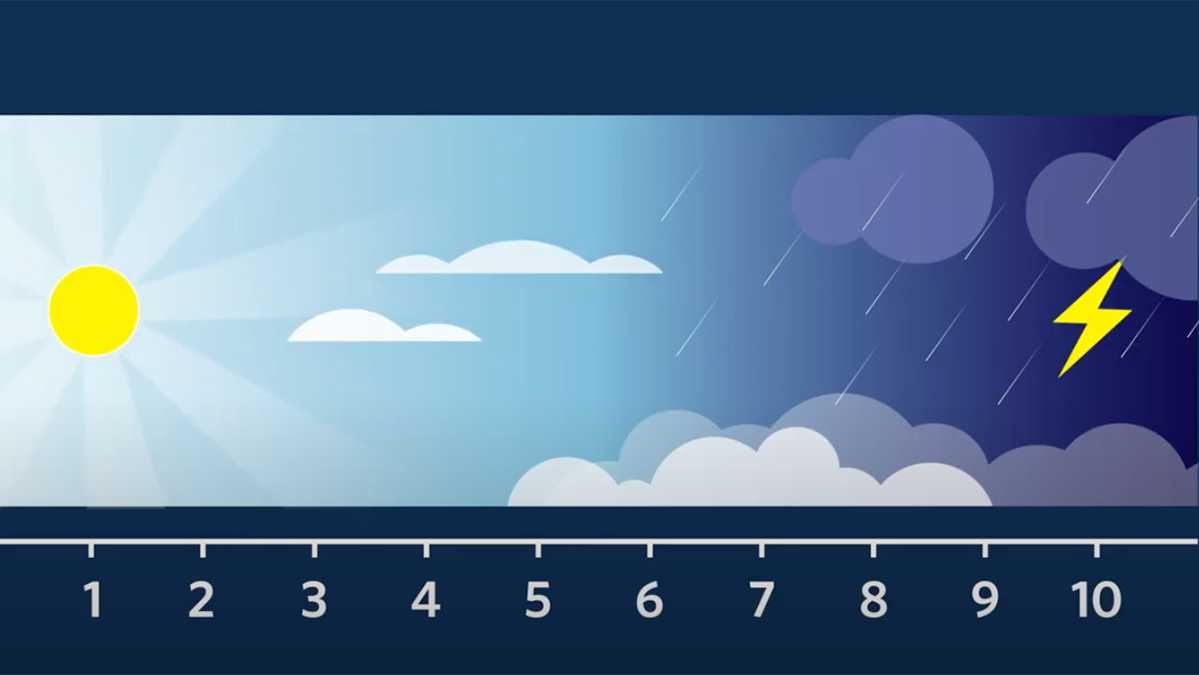
Press the play button to watch the video
Feeling stress throughout our day is normal. If we think of stress on a scale or continuum from 1 to 10, we typically move along that scale throughout our regular day. Daily stressors like school, work or relationships can activate different emotions, and those emotions can move us along the scale too.
Imagine you wake up feeling sunny and optimistic. “I’m a 1 on the stress continuum.” Then something triggers you and it feels like a cloud rolls in and the next thing you know you’re feeling down – like a 6 on the continuum. This is part of life, and we can usually manage this stress with healthy coping tools.
Right now, we have the added stress of COVID-19 and current events that can be chronic stressors. These stressors are even higher for those of us in the BIPOC and LGBTQ communities who regularly face racism and discrimination, in addition to a disproportionate burden of COVID-19. Plus, we don’t have access to our regular healthy coping tools like going out with friends or heading to the gym.
These chronic stressors make our normal daily stress seem more intense. Suddenly, that sunny day might feel less bright. If a cloud rolls in, it feels even more gloomy – like an 8 – and it becomes harder to get back to feeling less stress – such as a 3.
It’s natural to feel more foggy or tired or bothered by things that didn’t bother us before. When we accumulate all that stress, we feel exhausted. It is important to be gentle with yourself and others.
Here are some ideas that may help you on that path. Name and acknowledge what you feel. Take a deep breath and decide what support or coping tool works for you in that moment. If you are struggling, stuck in one spot on the continuum where you don’t want to be, or need help finding healthy coping strategies – then reach out for professional help.
Ideas to Cope
- Call a friend
- Practice “Three Good Things” daily
- Plan something to look forward to
- Take a walk outside
- Unplug from social media for one night a week
- Watch a favorite movie or TV show
- Read a book
- Start a new project (ie, home project, creative project, etc.)
- Help someone else — volunteer virtually for something your passionate about (lots of virtual volunteer opportunities are available now)
- Meditate, do yoga, move your body
- Write down your thoughts and feelings
- Pay attention – notice what’s around you and what’s happening inside you
- Create – writing, playing music, making art or dancing
- Have a good laugh or cry
- Most of all, realize the “COVID Cloud” amplifies all the stress so give yourself some slack
"caring" - Google News
November 03, 2020 at 01:40AM
https://ift.tt/3eqz20j
Caring for your mental health by monitoring stressors | UNC-Chapel Hill - UNC Chapell Hill
"caring" - Google News
https://ift.tt/2z0ngcp
https://ift.tt/3fgQ2Gv
Bagikan Berita Ini














0 Response to "Caring for your mental health by monitoring stressors | UNC-Chapel Hill - UNC Chapell Hill"
Post a Comment